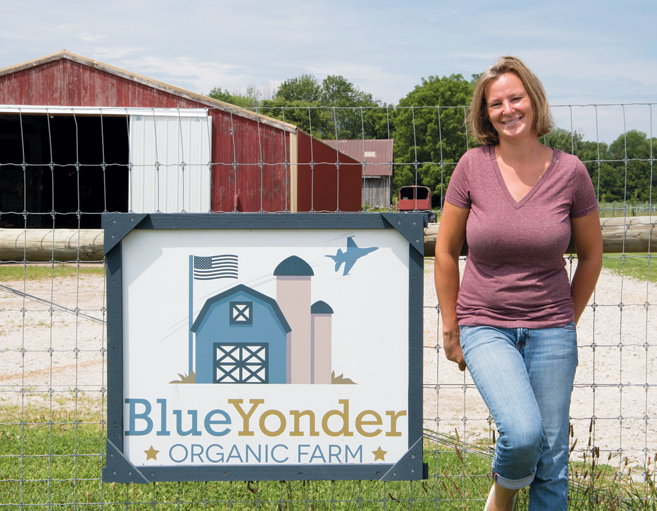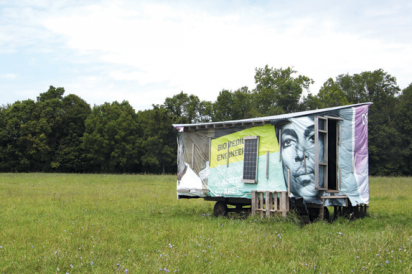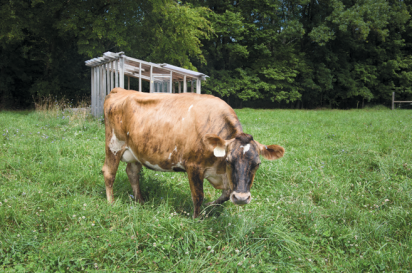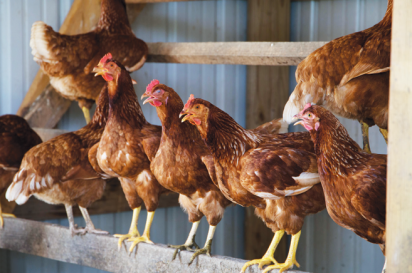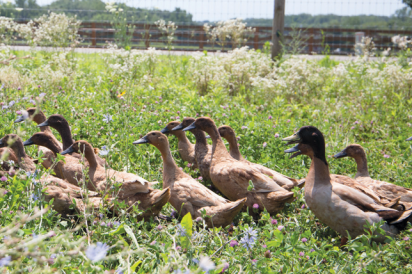Home at Blue Yonder
Sara Creech is a veteran farmer. While that might sound like she’s spent years plowing the fields, her story has a much different beginning. Creech, a retired U.S. Air Force nurse, owns and runs the aptly named Blue Yonder Organic Farm in North Salem. Talk to Creech today and she’ll happily tell you about her 400 chickens, six cows, 30 sheep, 30 to 40 ducks and a dozen turkeys. She’ll talk about her orchards, where raspberries, blackberries and strawberries grow. She’ll tell about the farmers markets where she canshare her bounty with customers on the lookout for good food.
Chat a little longer and you’ll find out about what brought Creech to the farm. You’ll find out why she’s passionate about good food, and equally passionate about reaching other veterans who might need the same sort of unencumbered healing that comes from working the earth.
“There’s something visceral and spiritual about the earth,” Creech says. “As a veteran, you see all this destruction and badness. You come to farming and it’s the complete opposite. Physically sticking your hands in the ground, it touches a part of you that is buried. It’s about building that hope again, seeing something positive. When you plant that seed, you have that hope that it’s going to become something bigger.”
A Veteran’s Story
Creech was in her early 20s when she joined the Air Force. A trained nurse, she was part of a mobile surgical team in Qatar, providing immediate medical care on the ground. An injury in 2006 sent her home for about nine months of therapy and healing. Diagnosed with Post-Traumatic Stress Disorder (PTSD) and panic attacks, Creech wondered how she could move forward. At the same time, a relationship was developing between Creech and her future husband, Chuck, an Air Force pilot. The couple communicated long-distance, and when Chuck landed stateside they moved first to Arizona and then to Florida.
There, Chuck was diagnosed with colon cancer. What doctors first said was something easily treatable turned out to be more. The couple moved to Texas for Chuck’s treatment, living in hotels and eating out. They started visiting farmers markets and learning about how diet might help a body heal. During their free time, they’d drive around looking at farms, imagining having their own one day. The dream was not meant to be. Chuck died in 2011, leaving a wife who felt she had nothing. “I couldn’t even step foot in a hospital without having a panic attack,” Creech says. “I couldn’t handle anything. I sat on the couch and played solitaire for six months.”
Healing Ground
Her Indiana sister suggested that Creech move here to start a farm with her sister and family. Creech found a foreclosed farm and bought it, sight unseen. She moved to North Salem with a farmhouse, 45 acres and no idea of where to start. Her sister’s family ultimately decided the location was a bit too isolated, but Creech’s parents and grandfather moved in with her.
Creech, who was also working full-time in case management, took an online course and signed up for a program called Armed to Farm, a program for veterans offered by Appropriate Technology Transfer for Rural Areas (ATTRA), a sustainable agriculture program with the National Center for Appropriate Technologies (NCAT).
Giving Veterans Solace In Farming
Veterans who return home may not know where to start settling down and making a living. AgrAbility, a USDA-funded program that works with disabled farmers, wants to help those veterans who are interested in farming.
“You’d be surprised at how many veterans are either farming or wanting to farm,” says Cindy Chastain, the veteran outreach coordinator for the National AgrAbility Project, which has its national office in Indiana. “Taking care of livestock and vegetables is therapeutic. It gives some soldiers a reason to live. You’d be surprised at the impact farming has had on veterans’ lives.”
Chastain, a 31-year Army veteran herself, has partnered with Sara Creech, an Air Force veteran farm owner, and Kevin Gibson, a Purdue professor who is also an Army veteran, to form the Indiana chapter of the Farm Veteran Coalition. They hope to reach veterans who are interested in farming, or even those who might just want to tend to a garden in their backyards.
Beginning farmers face challenges, Chastain says. Most don’t have the millions of dollars needed to start a large farm. They might, however, be able to buy something in the 10- to 20-acre range. Organizations like FVC try to match veterans with resources that will help them succeed. The Purdue University Extension Service is a trove of useful information about growing and harvesting. Veterans may also be eligible for special USDA loans to help them launch a farming business.
Chastain recommends that veterans and other small farmers find a specialty. For instance, Creech’s commitment to organic farming means she has to drive several hours to get special food for her chickens, but her customers are willing to pay for the end product. Farm finances are an important subject, and the Indiana FVC hopes to offer a workshop soon for interested veterans. The harvest, though, is more than a basket of produce.
Veterans especially seem to find solace in growing food, Chastain says. They take comfort in the responsibilities and feel a special connection to the land. Their diets become healthier as they start eating the things they have grown. They learn that fresh-grown vegetables or farm-fresh eggs taste better than what they’re used to, and their diets improve.
The Indiana FVC hopes to help more veterans begin to grow their own futures.
“I don’t think our job is getting veterans interested in farming,” Gibson says. “I think it’s helping them see a possibility. I think our challenge is developing networks of veterans and helping them find the resources.
The program sent her to Arkansas, where she and other veterans toured farms and orchards, learning about chickens, produce and the farm business. She came home and decided to focus on organic agriculture. She bought some chicks, tended the berries she had planted earlier and sold her harvest at the Danville Farmers Market.
“I was scared to death still,” Creech admits. “But I found that I loved it. I loved talking to people. I tell veterans that farmers markets are a safe space to get back into the community.”
Giving Back
Speaking of veterans, Creech knew she wanted to share what the farm was giving her. She began offering picnics for veterans and their families on the first Sunday of each month. She became involved in Operation Groundwork, a farm training program for veterans. The program put her in touch with Kevin Gibson, a Purdue professor in the botany and plant pathology department and a weed scientist. She also met Cindy Chastain, the veteran-outreach coordinator for the AgrAbility Project (see below), a national program based at Purdue. Together, the three started the Indiana Chapter of the Farmer Veteran Coalition (FVC) in late 2017. “[Creech’s] story is powerful and full of hope,” Gibson says. “Her farm is a wonderful place to visit.”
The Indiana FVC’s first big project was an April shiitake mushroom workshop for veterans at Blue Yonder Organic Farm. Creech, Gibson and Chastain have a list of veterans who are interested in farming or even just tilling a garden at home, and they hope to continue these outreach efforts, especially among veterans at the northern and southern ends of the state.
As for Creech, her farm is blossoming. She works full-time on the farm now, and last year she hired her first full-time employee. In addition to her fresh eggs and organic meat, she sells a menu of fruits and vegetables at the Carmel Farmers Market and other outlets. Her farm focuses on sustainability, using repurposed materials like an old billboard sign that covers the chicken coop. She welcomes visitors, including her nieces and nephews and any veteran who wants to see what’s going on.
She gets dirty and messy and covered in poop some days, and she wouldn’t have it any other way. Her life’s journey wasn’t easy, she says, but she’d do it all again, because the love she shared with Chuck outweighed the pain of losing him, and the bumps along the way brought her home to Blue Yonder.
“I feel like I’m exactly where I’m supposed to be,” Creech says. “I am totally at peace with what I’m doing.”
Blue Yonder Organic Farm | 5262 N. State Rd. 75, North Salem | BlueYonderOrganicFarm.com | 765.336.1154
Learn more about the AgrAbility program at www.AgrAbility.org


